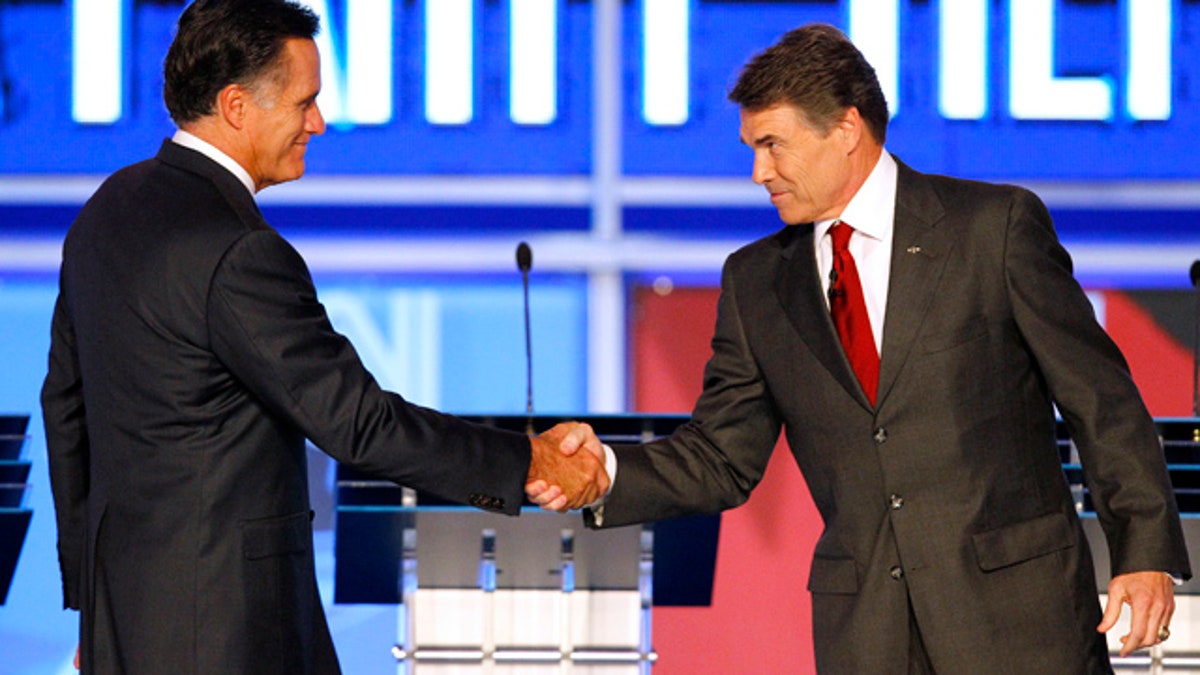
Sept. 12: Republican presidential candidates former Massachusetts Gov. Mitt Romney shakes hands with Texas Gov. Rick Perry before the start of a Republican debate in Tampa, Fla. (AP2011)
DES MOINES, Iowa – Republican presidential candidate Mitt Romney paid for automated telephone messages in Iowa accusing rival Rick Perry of contributing to illegal immigration.
It is the former Massachusetts governor's first attack message against Perry. And it's the clearest sign yet of Romney's hope of winning Iowa's leadoff caucuses.
The messages, which began late Thursday, also show that Romney sees the Texas governor as the more significant threat to his self-portrayal as the leading candidate on the economy, despite Herman Cain's lead in recent Iowa and national polls.
Despite the economy's dominance as a campaign priority, immigration remains a sticking point with GOP activists.
"Rick Perry is part of the illegal immigration problem," Sheriff Paul Babeu, from southwestern Arizona, says on the message.
"A lot of the candidates agree we need a border fence. And almost all of them agree in-state tuition for illegal immigrants is wrong," adds Babeu, a prominent national spokesman against illegal immigration who is weighing a campaign for Congress. "However, Rick Perry disagrees. Rick Perry not only opposes a border fence. But he signed the bill to make Texas the first state in the nation to grant in-state tuition discounts to illegal immigrants."
Romney has criticized Perry publicly for weeks on his immigration positions, especially his signing of the bill allowing in-state tuition benefits for illegal immigrants who came into the country as children and lived in Texas at least three years.
Perry's campaign said Friday the attacks raise questions about whether a bill Romney signed in Massachusetts allowed illegal immigrants access to health care benefits.
"The magnetic pull of his free health care for illegal immigrants made Massachusetts an attractive destination," Perry spokesman Ray Sullivan said.
Romney aides have said regulations put into effect after Romney left office in 2007 made it easier for illegal immigrants to receive care under a 2006 change.
The Romney calls in Iowa were aimed at assembling an audience for an evening telephone campaign event featuring Babeu and came as Perry was campaigning in the Des Moines area. Phone numbers where no one picked up the call received the minute-long message from Babeu.
The call also comes as Romney, who has kept a low profile in Iowa since his disappointing 2008 second-place finish in the state, is pivoting to focus more on the caucuses, now less than two months away.
Although Romney has only visited Iowa three times this year, he has added staff to his small core of paid advisers and is planning to add more.
And he plans to campaign Monday in eastern Iowa counties he carried four years ago, just 18 days after visiting western Iowa and declaring: "I will be here again and again. I'd love to win Iowa. Any of us would."
Romney has been the most durable Republican prospect in Iowa this year, at or near the top of polls of likely caucusgoers since entering the race in June, while other more conservative rivals have risen, including Minnesota Rep. Michele Bachmann and Cain, a businessman who narrowly tied Romney in a new national poll and led narrowly in a Des Moines Register poll published Sunday.
But Perry has begun advertising aggressively about Texas' robust job growth with two Iowa ads in the past 10 days, and had $15 million banked in October to keep up the pace.
Romney, emphasizing his decades in business more than he did four years ago, has not sought out evangelical conservatives in Iowa, many of whom are leery of his changed position on abortion rights and his Mormon faith. Romney has chosen instead to approach Iowa by reaching out to former supporters and pro-business conservatives and has rebuilt a good portion of his 2008 network.

